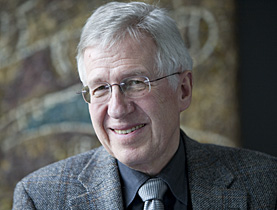Red Cross ideals still under fire

The Swiss Red Cross faces many challenges according to its president, René Rhinow, not least on the international front.
Rhinow told swissinfo that the core Red Cross values – impartiality, neutrality and independence – set out by the organisation’s founders in the 19th century were still being challenged around the world.
Rhinow, a former senator and president of the Swiss Red Cross since 2001, says wars, catastrophes and other events make it difficult to work abroad. Sri Lanka, Gaza and Guantanamo are just some of the issues faced by the organisation.
The Swiss Red Cross is a member of the Geneva-based International Federation of Red Cross and Red Crescent Societies. It also backs the work of the Swiss-run International Committee of the Red Cross.
swissinfo: You receive requests for help from all over the world. How does the Swiss Red Cross decide where it can intervene?
René Rhinow: Normally we act when there is a major catastrophe and we have the means to do so. We work with our partners on the ground, usually the local Red Cross or Red Crescent organisation.
swissinfo : The Swiss government has suggested that it might be prepared to accept a small number of Guantanamo detainees if they are released by the United States. The Swiss Red Cross has also offered its help.
R.R.: The Swiss Red Cross has run a programme for torture victims for more than ten years. So we are prepared to help if Switzerland wants to accept Guantanamo prisoners.
swissinfo: Sri Lanka is in the midst of civil war and could face a humanitarian catastrophe. What is your role there?
R.R.: We began working in Sri Lanka after the 2004 tsunami and helped with reconstruction projects. That is still our focus today. We also work with the ICRC there, although the committee is focusing mainly on the conflict.
swissinfo: You have also set up a family member search service for Tamils in Switzerland. How does that work?
R.R.: We help people from Sri Lanka living in Switzerland to find lost family members. We can do this because of our presence on the island and our cooperation with the local Red Cross.
swissinfo: Are you taking part in the reconstruction of Gaza?
R.R.: We have been sending the Palestinian Red Crescent medical supplies for some time now. After the latest conflict, we are offering more medical support to our local partners and the ICRC. But we are not present on the ground there.
swissinfo: What were your thoughts when Israeli bombardments hit convoys operated by international organisations, schools and hospitals?
R.R.: The suffering of so many innocent people touched me. We can hardly imagine what the Palestinians in Gaza went through.
The fact is that Red Cross ideals were also ignored by a so-called civilised state. Access to the victims of the conflict was not guaranteed. The precarious situation of international humanitarian law makes me very sad too.
swissinfo: When you look at all the work carried out by the Swiss Red Cross at home and abroad, one can wonder if there isn’t a lack of focus.
R.R.: That is true to a certain extent. But the Swiss Red Cross is the sum of all its local associations, and that’s how we developed. It’s a very Swiss way of doing things, a development that began at the grassroots level with the creation of local associations.
This is the Swiss way – bringing together diversity, combining autonomy with direction. Our associations are close to the people, which explains why the Swiss Red Cross is so integrated into our society.
swissinfo: You work mainly with volunteers. The advantage is they have a lot of potential and cost next to nothing. Are there disadvantages to this?
R.R.: The ideals of the Red Cross are closely linked to the idea of volunteer work. This is how the organisation’s founder, Henri Dunant, worked on the battlefield of Solferino, helping the wounded with volunteers.
We could never do our work around the world without volunteers. The advantage is that there are motivated people whose first thoughts are not about money.
Our challenge is to make that volunteer work attractive. Today, people don’t consider volunteer work as just helping others. They also want personal satisfaction and recognition. That requires special care from our side. We can’t just train volunteers, we also have to train those who look after the volunteers.
swissinfo-interview: Jean-Michel Berthoud
Most of the Swiss Red Cross’ work takes place in Switzerland.
There are two main focuses: Health and Integration, as well as Rescue and Emergency Aid.
Health and Integration are mainly carried out by local sections through different programmes.
Rescue and Emergency Aid are tasks handled by organisations such as the Swiss air rescue service, Rega, and the Samaritans.
The Red Cross also runs a nationwide blood-donor service.
René Rhinow was born in 1942.
Legal counsel for canton Basel Country between 1972 and 1977.
President of the canton’s administrative court between 1978 and 1981.
Professor of law at Basel University from 1982 to 2006.
He was a senator for his canton between 1987 and 1999.
Since 2001, he has been the president of the Swiss Red Cross and vice-president of the International Federation of Red Cross and Red Crescent Societies.

In compliance with the JTI standards
More: SWI swissinfo.ch certified by the Journalism Trust Initiative













You can find an overview of ongoing debates with our journalists here . Please join us!
If you want to start a conversation about a topic raised in this article or want to report factual errors, email us at english@swissinfo.ch.